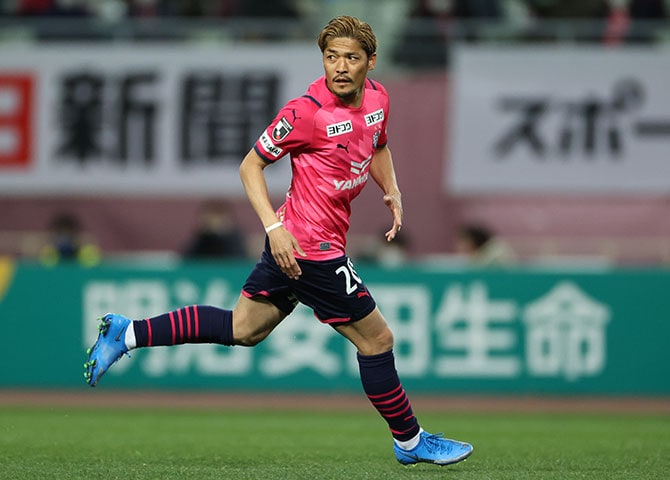




Profile
Born on June 9, 1982 in Fukuoka, Japan. He won the high school triple crown at Kunimi High School in Nagasaki, made his professional debut with Cerezo Osaka in 2001. He has played in Spain and Germany, and was the J-League's top scorer for three consecutive years while playing for Kawasaki Frontale. He also played for Japan National Team in the World Cup in South Africa and Brazil. In 2021, returned to Cerezo Osaka for the first time in 15 years. Since the middle of the season, he has moved to Osaka and been living with his third son away from the rest of his family, and has also taken on the role of tending the home and child. His total of 191 goals claims the honor as J1 League’s leading goalscorer of all-time. After the 2021 season, he retired from 20 years of professional football career.
Born on June 9, 1982 in Fukuoka, Japan. He won the high school triple crown at Kunimi High School in Nagasaki, made his professional debut with Cerezo Osaka in 2001. He has played in Spain and Germany, and was the J-League's top scorer for three consecutive years while playing for Kawasaki Frontale. He also played for Japan National Team in the World Cup in South Africa and Brazil. In 2021, returned to Cerezo Osaka for the first time in 15 years. Since the middle of the season, he has moved to Osaka and been living with his third son away from the rest of his family, and has also taken on the role of tending the home and child. His total of 191 goals claims the honor as J1 League’s leading goalscorer of all-time. After the 2021 season, he retired from 20 years of professional football career.

Returning to Cerezo
after 15 years,
I find myself
enjoying football.

Yoshito Okubo scored the first goal for Cerezo Osaka in 2021. And the goal on the last day of the season on December 4 was scored by his lead.
He returned to his old club, Cerezo Osaka after 15 years and retired this year while his play will be missed by many fans. He scored 191 goals in his career which is the most ever in the J1 League and is still remembered by fans as a legendary goalscorer. Yoshito Okubo looks back at when he made a big decision and talks about the driving force behind his professional career.
- Q: You returned to Cerezo after 15 years and scored in three consecutive games since the start of the season. You once said that you were not burned out. Did you get your intuition for scoring back this year?
- I've always been confident that I can score when I get the ball, and I am glad that I was able to show that I haven't lost it. When I moved to Kawasaki Frontale in my 30s, they said that I was no longer good enough, but I won the top scorer three years in a row, and this time I was able to show that I can score when I receive the pass.
To be honest, I didn't think I would be able to continue playing football until I was 39. It is just a job for me, and when I was young, I kind of wanted to retire as soon as possible. I thought I was going to quit when I turned 30, but then I started to change. You know people can change. (Laughs) At this age, I've learned more about the sport and now I know what's going on around me in the field and I'm really enjoying it and me passing on my experience and skills to the younger players and help the team improve to win games. That's the kind of fun I enjoy.
- Q: You and your son moved to Osaka. Did you find your new life, including house chores, to be hard?
- It's not hard at all. I was being positive and excited that I would be able to learn new things. As for housework, I am proud of the skills I got now and actually happy to do them for my children. When I go to the training after cleaning my house, I feel great which is probably good for my play.

Believing in my game
for my dignity
and my family,
this is what drives me.

The forwards are players who always need to score. Okubo, the all-time record holder, talks about what it takes.
- Q: As a forward player, how did you keep getting results under a lot of pressure?
- It's about making the ball passed to me. I always make sure other members know I am ready to shoot if they pass the ball like, “Just pass it and blame me if the defender intercepts it.” I constantly ask for the ball to me. Forward players would be replaced if they don't score goals. I needed to keep my presence on radar, otherwise I would be invisible and gone among other players. For a long time now, I've been really consistent about that. People around me sometimes criticize me, but I don't care if they don't like what I am doing. I'm the one who has to do it to make the team stronger.
- Q: You have bounced back from adversity in the past. When was the hardest time for you in your football career?
- It has been hard all the time. The only time I was really good was during my four years with Kawasaki Frontale. That was the football I wanted to play. Except that time, I have never felt the same satisfaction about playing football. I think all players are probably like that, too.
- Q: What is the driving force in your engine?
- I always feel like “you will see”. I prefer to be put in adversity and go, "Let's do it!" The joy you feel when you overcome is immeasurable. I know my style, and I'm confident that I'm doing it right. All I have to do is that I'm going to bring all out in the game.
- Q: Is that coming from anger?
- Anger? I don't think so. I think it is from my motivation. When I am not sure if I can score, I look around if there are someone to pass the ball. But I believe in myself and my game. If I shoot it, I will make it. I'm not angry at anyone, it's just that I'm trying to remember what I'm really good at and inspire myself that I can definitely do it.
- Q: Why and how did you continue to be a professional athlete for so many years when you know it is a very competitive field of job?
- The only reason I practice and play football for this long was for my family. When I talked to my son about quitting a few years ago, he said, "I love my daddy as a professional baller, too.” My kids love to see me score, and when we talk on the phone after a game in which I score, they sound so happy and all excited. That makes me feel loved and inspired. I love my family.

Keep going down
the path you believe
no matter how old you are
or what other people say.
the path you believe
no matter how old you are
or what other people say.

At his retirement press conference, he said that his style of play caused him trouble. He also said that he felt that today's young players are all “good players” but never standout. There must be something to be learned from the experience and penetrating attitude of a player who has achieved so much.
- Q: Looking back on your professional life, if you had to tell something to Yoshito Okubo in his 20s, what would it be?
- I'd like to say well done to him for continuing to play aggressively even after being kicked out of the game so many times. Of course, I got criticized for my aggressiveness. But without it, I couldn’t play my game. The results were completely different when I played with a fighting spirit out of the frustration that I was feeling of myself, and I did well to keep doing that. When I try to play calmly, there is no concentration in my mind but only a half-hearted effort in everything.
- Q: You said, I've always been willing to take on challenges, and I want to continue to do so. What advice would you give to young people who are trying to become professional football players?
- When you work hard and trying to be something, you need a clear long-term target of what you want to be. Do not be short-sighted. I believe that by keeping the passion of yours and trying hard with better perspective, you can tackle even the toughest things in a positive manner. If you feel like giving up, remember the dream you had in the beginning. When you look back the way you’ve come, you will be surprised how much you grow like you can make plays that you didn't realize you could, and you will feel achieved and incredible about yourself. So, keep it up!






































